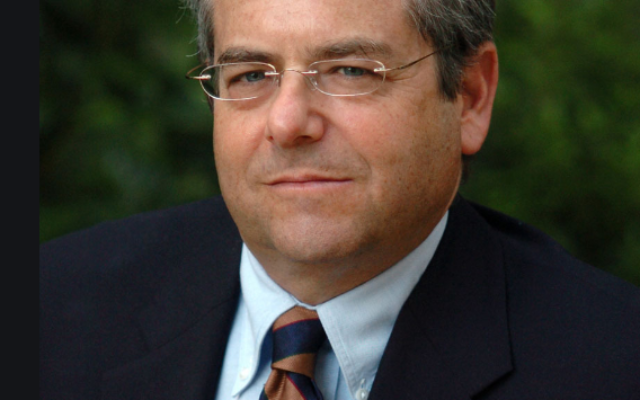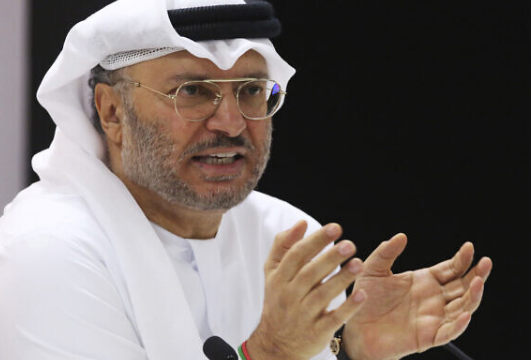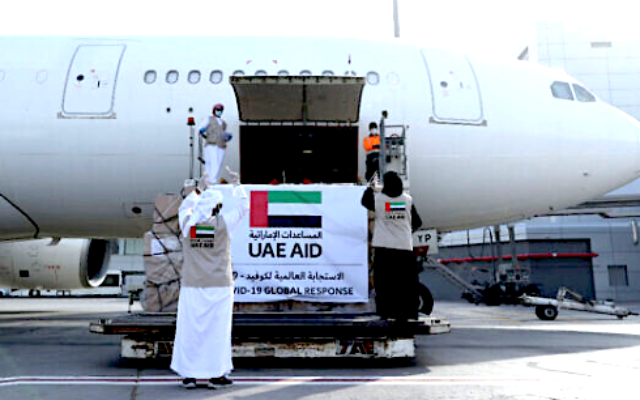Israel and UAE Grow Closer in Changing World
Israeli expert on Arab world tells AJT ties are strong, “While annexation is troubling to the Gulf States, they do not see it as a deal-breaker for relations with Israel."
UPDATE AS OF FRIDAY, JUNE 26: On Thursday, June 25, Israel and the UAE indicated they will work together to develop medical initiatives to confront the coronavirus pandemic. The historic initiative is expected to involve private companies from the two nations rather than direct government-to-government cooperation. The two countries do not have diplomatic relations.
One of Israel’s leading experts on the Arab world believes that closer ties between Israel and the United Arab Emirates are likely to survive even if Israel annexes parts of the West Bank.
Dr. Joshua Teitelbaum, who was born in the U.S., received his undergraduate education at UCLA and made aliyah 38 years ago, said that if Israel’s coalition government goes forward with annexing parts of the West Bank, it will not fundamentally alter the ties that have been developing over the past several years.
“While annexation is troubling to the Gulf States, they do not see it as a deal-breaker for relations with Israel.”

Teitelbaum teaches modern Middle Eastern history and is a senior research associate at the Begin-Sadat Center for Strategic Studies at Bar-Ilan University. He has been a visiting professor at Stanford, Cornell, the Hoover Institution and The Washington Institute for Near East Policy.
On Tuesday, June 16, UAE’s Minister of State for Foreign Affairs Dr. Anwar Gargash in a first-ever appearance before a major American Jewish organization, said he wanted more co-operation with Israel, particularly in areas such as technology and health.
“Can I have a political disagreement with Israel but at the same time try and bridge other areas of the relationship? I think I can. I think that is fundamentally where we are.”
The comments by the UAE leader came during a 45-minute interview for the American Jewish Committee’s Virtual Global Forum. Gargash said, in effect, that attempts by the Arab world to isolate Israel over the past 72 years haven’t worked.

“We have tried that, as a group of Arab countries, over many years, and I don’t think it has really led to what we want in terms of bringing stability to the region.”
In an interview with the Atlanta Jewish Times, professor Teitelbaum maintained that the UAE and Saudi Arabia are more concerned about the growing power of neighboring Iran than they are about the plight of the Palestinians.
“Iran is an existential threat to them. And they seek allies against Iran. And Israel is the main ally for them against Iran, as it has been for many years, even before the present administration in the United States.”
The Emirati foreign minister followed up the next day when he told an online audience of the Middle East Institute in Washington that annexation could endanger the promise of a two-state solution to the standoff between Israel and the Palestinian Authority. This is a solution, many believe, that could end the identity of Israel as a Jewish state.
Gargash said “ultimately, I personally believe that if we are going where we are going today, and we lose the possibility of really implementing a two-state solution, we will really be talking about equal rights and one state.”
Despite the apparent thaw in relations with the UAE and to a certain extent with the Saudis, professor Teitelbaum was cautiously optimistic about whether further diplomatic progress might be extended to more traditional, hard line Arab countries. The nations of the Arabian Peninsula, he pointed out, are different.
“Arab nationalism is a late-comer for these countries. These countries are run by families. They are family businesses. So the concerns of these countries tend to be more narrow and less committed to the causes of the Arab world and in particularly the Palestinian cause.”
He emphasized that Israel has developed close ties with the leadership of the UAE, where the Jewish community there has emerged from the shadows and officially announced itself on Twitter.
Last year in Dubai, which is part of the UAE, a kosher caterer opened for business. There was to have been an official Israeli presence at the now-postponed Dubai Expo and Israel maintains offices in Dubai for a U.N. organization to which it belongs.
Part of the newfound closeness between Israel and its new friend in the Arab world, Teitelbaum believes, is the result of a vacuum created by recent American actions to disengage in Syria, Iraq and Afghanistan.
“These countries that have befriended Israel are concerned that the United States is no longer leading the fight against Iran and they are seeking out regional allies. So that brings them close to Israel. They can’t count on the United States like they once did.”
Nonetheless, the Palestinians maintain their hostility toward any attempt to normalize relations with Israel before a comprehensive peace settlement.
In an effort to boost Palestinian efforts to confront the COVID-19 pandemic, the UAE has sent two cargo planes filled with medical supplies to Israel’s Ben-Gurion International Airport near Tel Aviv, most recently on June 10. The air cargo shipments were the first ever between the two nations. The Palestinians refused the shipments, which total 100 tons of badly needed medical supplies, because of what they symbolize.
For now, Teitelbaum maintains, everyone is just waiting and watching to see when and how, and even if Israel goes through with annexation.
“I think annexation will complicate relations with the UAE and with Saudi Arabia and Israel because although these countries are not deeply committed to the Palestinian cause, they don’t want to be associated or seem to be associated with an Israel that is preventing a peace process. They don’t want to seem to be eliminating options for a peace process or be seen to be operating unilaterally.”
- Palestinian authority
- Near East Policy
- Bar-Ilan University
- Begin-Sadat Center for Strategic Studies
- The Washington Institute for Near East Policy
- Dr. Anwar Gargash
- Dr. Joshua Teitelbaum
- United Arab Emirates
- UCLA
- American Jewish Committee
- Virtual Global Forum
- Saudi Arabia
- United States
- Stanford
- Cornell
- the Hoover Institution
- The Washington Institute
- West Bank
- Palestinians
- News
- Israel news
- COVID-19
- cargo
- medical supplies
- Ben Gurion International Airport




comments